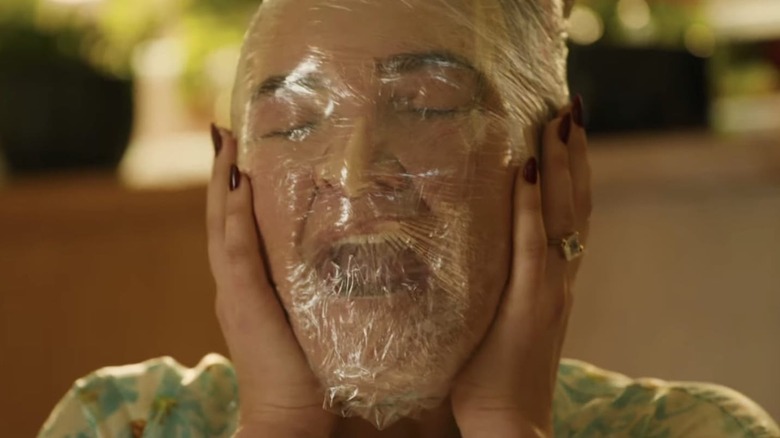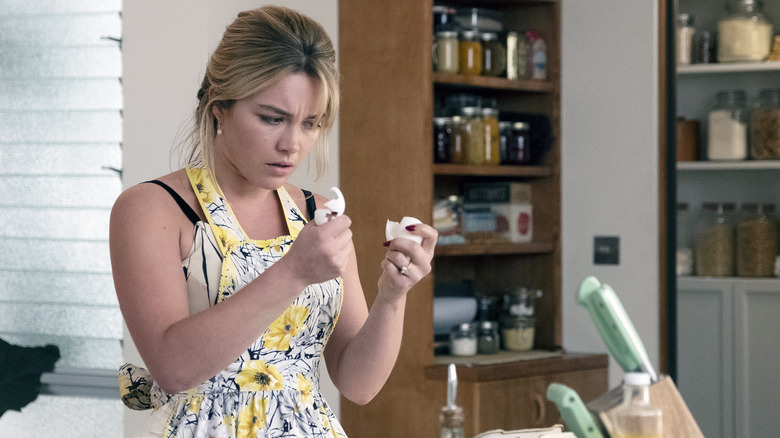Florence Pugh's Most Disturbing Scene In Don't Worry Darling
In Olivia Wilde's sophomore feature "Don't Worry Darling," we become, well, quite worried quite quickly, thanks to an incredible, heart-pumping lead performance by Florence Pugh. The actor is known at this point for her skill in these types of roles — the ones where the leading lady is desperate to escape whatever she fears her fate is — so her turn in the idyllic and uncanny thriller was primed to be excellent, no matter how the rest of the film turned out to be, and it did not disappoint. In fact, Pugh does some of her most effective and terrifying work yet in "Don't Worry Darling," thanks to its harrowing concept.
The film follows Pugh as Alice, a beautiful housewife who spends her days cooking, cleaning, and loving her too-handsome husband, Jack (Harry Styles). Their lives in the utopian 1950s style California desert community as part of a mysterious group called The Victory Project is, in a word, perfect. That is, until Alice starts hearing and seeing things that make her suspicious of what goes on in Victory, and how her husband might be involved in whatever seems to be going wrong. "Don't Worry Darling" is as it purports itself to be, a feminist anthem about gaslighting and autonomy, which is why it almost seems as though Pugh was destined to lead it. The film gave her room to settle into terror in a way only she seems to know how, and it made space for some particularly upsetting scenes.
Sickness and saran wrap
Pugh's most disturbing scene in "Don't Worry Darling" comes towards the middle of the film, when her unexplainable visions paired with seemingly unconscious actions of self-sabotage come to a head. Up until this point in the film, Alice has been grappling with things she doesn't fully understand yet; all she knows is that these things are driving her to act strangely and dangerously.
After a fight with her husband during which she tries to get him to understand why she feels there is something wrong going on in Victory, Alice can be seen packing up sandwich materials with saran wrap in her kitchen. Once she packs up the last bit of provisions, she takes the saran wrap and starts to envelop her face in the plastic covering. Once she has enough of it secured, she adjusts it to make sure no air can get through. Obviously, that's not something someone of sound mind would do — and she acknowledges this moments later when she rips the plastic from her face in a frenzied panic. Something is obviously very, very wrong.
What makes this scene so effective, especially among the other impulses that Alice faces in the lead-up to this moment, is its brutality. Suffocation is a cruel and terrifying way to die, and to be in a mental state where you would choose that for yourself is a dire situation. It's Pugh doing what she does best, sinking into the belly of where despair and horror combine before trying desperately to claw her way back to the edge. It's damn good acting and, frankly, it's just a taste of what she does in this film.
Skills on all sides
Pugh acts her tail off in this scene. It's deeply unsettling to watch her smooth over the saran wrap and make sure she's suffocating, before sinking into the decision she's made — but a major part of what sells her top-notch performance is the creative work behind the camera.
This scene in particular is a marriage of the elements, one that truly proves that filmmaking is a collaborative effort at heart. Wilde's directing calls for close-ups in this scene, forcing us to be as in the moment with Alice's efforts as we don't want to be. The focus is on the mouth, the way it gapes and struggles for breath as the plastic billows in and out. It's also on the hands, the way they trap Alice and free her in varying moments of ease and fear. Matthew Libatique's cinematography aids in the visual storytelling here with immersive cuts and strong focus. Plus, the film's sound design and score do well to punctuate this scene in a way that feels urgent, eerie, and tense. The sound design and score of "Don't Worry Darling" deserve a lot of praise on the whole — John Powell's work is particularly effective and evocative throughout — but they are on full display in this moment in a way that really sets up the tension.
Ultimately, Florence Pugh's "Don't Worry Darling" performance is full of compelling acting and strong character work. Almost any scene could be considered disturbing in this film, where the insidiousness of truth is hiding around every corner for Alice to find, if only she can remember. One thing is for certain, though: this disturbing scene is one you simply won't forget.


